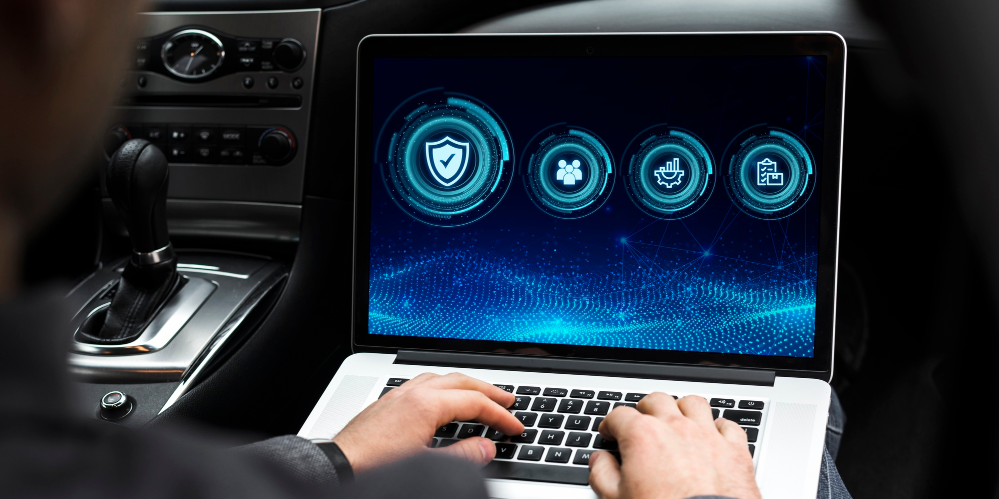Navigating the Perilous Road of Automotive Hacking
As modern vehicles become increasingly reliant on sophisticated interconnected technologies, the threat of automotive hacking has emerged as a formidable cybersecurity challenge. The potential consequences of a successful car hack are extensive. This involves unauthorized access to personal data and remote control of vehicle functions that ultimately putting both drivers and passengers at risk.
In this comprehensive guide, Cliffguard Cybersecurity delves into the intricacies of automotive hacking, exploring its evolving landscape, the intricate vulnerabilities exploited by hackers, and the critical measures necessary to safeguard vehicles from cyberattacks.
Decoding the Landscape of Automotive Hacking: An Overview
Automotive hacking refers to the unauthorized access and manipulation of a vehicle’s electronic systems, often with malicious intent. Hackers exploit vulnerabilities in the vehicle’s software, hardware, or communication protocols. As a result, they can gain control over critical functions such as braking, steering, and engine performance.
The rise of connected cars, equipped with advanced features like infotainment systems and remote diagnostics, has expanded the attack surface for hackers. These vehicles rely on wireless connectivity, providing hackers with potential entry points to exploit system flaws and compromise vehicle security.
Unveiling the Arsenal of Automotive Hacking Techniques
Cybercriminals employ a diverse range of techniques to infiltrate vehicle systems, including:
-
Keyless Entry Hacking: Targeting the vehicle’s keyless entry system, hackers can unlock doors and start the engine without physical access to the key fob.
-
CAN Bus Hacking: The Controller Area Network (CAN) bus serves as the backbone of vehicle communication, exchanging data between various electronic control units (ECUs). Hackers can intercept and manipulate CAN bus messages to interfere with critical vehicle functions.
-
OBD-II Hacking: The On-Board Diagnostics (OBD-II) port provides access to vehicle diagnostic data. Hackers can connect to the OBD-II port using specialized tools to gain unauthorized access to the vehicle’s systems.
-
Software Vulnerabilities: Exploiting vulnerabilities in the vehicle’s software, hackers can execute malicious code to disrupt vehicle operations or steal sensitive data.
Fortifying the Automotive Fortress: Cybersecurity Measures to Counter Hacking
Automotive manufacturers and cybersecurity experts are devising innovative strategies to combat automotive hacking, including:
-
Secure Software Development: Implementing secure coding practices and rigorous testing procedures can reduce the likelihood of software vulnerabilities that hackers can exploit.
-
Enhanced Network Security: Encrypting vehicle communication protocols and implementing robust authentication mechanisms can safeguard the integrity of data exchanged between systems.
-
Vulnerability Management: Establishing a comprehensive vulnerability management program involves identifying, prioritizing, and promptly patching software weaknesses.
-
Consumer Awareness: Educating vehicle owners about the risks of automotive hacking and empowering them to adopt cybersecurity best practices is crucial for mitigating cyberattacks.
Cliffguard Cybersecurity: Your Guardian on the Road Against Automotive Hacking
Cliffguard Cybersecurity recognizes the growing threat of automotive hacking and is committed to providing cutting-edge cybersecurity solutions to protect vehicles from cyberattacks. Our comprehensive suite of cybersecurity services includes:
-
Automotive Cybersecurity Assessments: Identifying and evaluating vulnerabilities in vehicle systems to prioritize remediation efforts.
-
Penetration Testing: Simulating real-world cyberattacks to uncover and address potential attack vectors.
-
Cybersecurity Training: Educating automotive personnel on cybersecurity best practices to enhance cyber resilience.
-
Cybersecurity Incident Response: Providing expert assistance in the event of a cyberattack to minimize damage and restore normal operations.
As automotive technology continues to advance, the cybersecurity landscape will evolve, necessitating continuous vigilance and adaptation. Cliffguard Cybersecurity stands as a trusted partner in the automotive industry and committed to safeguarding vehicles from the evolving threats of cyberattacks. Together, we can navigate the perilous road of automotive hacking, ensuring that connected vehicles remain a symbol of innovation and safety.
In the age of connected cars, security isn’t a luxury, it’s a necessity.
By Cliffguard

